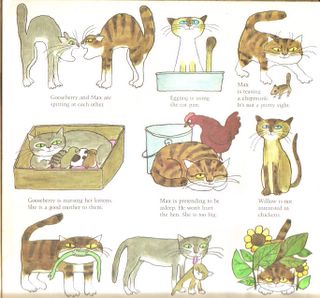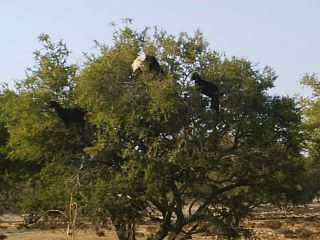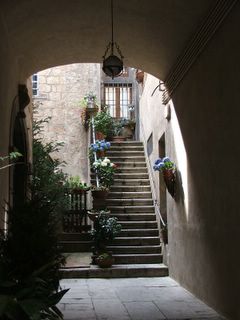Sunday, January 29, 2006
The Stillness of the World Before Bach
By Lars Gustafsson
Norway
There must have been a world before
the Trio Sonata in D, a world before the A Minor Partita,
but what kind of a world?
A Europe of vast empty spaces, unresounding,
everywhere unawakened instruments
where the Musical Offering, the Well-Tempered Clavier
never passed across the keys.
Isolated churches
where the soprano line of the Passion
never in helpless love turned round
the gentler movements of the flute,
broad soft landscapes
where nothing breaks the stillness
but old woodcutters’ axes,
the healthy barking of strong dogs in winter
and, like a bell, skates biting into fresh ice;
the swallows whirring through summer air,
the shell resounding at the child’s ear
and nowhere Bach nowhere Bach
the world in a skater’s stillness before Bach.
Norway
There must have been a world before
the Trio Sonata in D, a world before the A Minor Partita,
but what kind of a world?
A Europe of vast empty spaces, unresounding,
everywhere unawakened instruments
where the Musical Offering, the Well-Tempered Clavier
never passed across the keys.
Isolated churches
where the soprano line of the Passion
never in helpless love turned round
the gentler movements of the flute,
broad soft landscapes
where nothing breaks the stillness
but old woodcutters’ axes,
the healthy barking of strong dogs in winter
and, like a bell, skates biting into fresh ice;
the swallows whirring through summer air,
the shell resounding at the child’s ear
and nowhere Bach nowhere Bach
the world in a skater’s stillness before Bach.
Saturday, January 28, 2006
Cobalt
From The Silence Afterwards
by Rolf Jacobsen
translated from the Norwegian by Roger Greenwald
Princeton: Princeton University Press, 1985
Colors are words’ little sisters. They can’t become soldiers.
I’ve loved them secretly for a long time.
They have to stay home and hang up the sheer curtains
in our ordinary bedroom, kitchen, and alcove.
I’m very close to young Crimson, and brown Sienna
but even closer to thoughtful Cobalt with her distant eyes and
untrampled spirit.
We walk in dew.
The night sky and the southern oceans
are her possessions
and a tear-shaped pendant on her forehead:
the pearls of Cassiopeia.
We walk in dew on late nights.
But the others.
Meet them on a June morning at four o’clock
when they come rushing toward you,
on your way to a morning swim in the green cove’s spray.
Then you can sunbathe with them on the smooth rocks.
--Which one will you make yours?
by Rolf Jacobsen
translated from the Norwegian by Roger Greenwald
Princeton: Princeton University Press, 1985
Colors are words’ little sisters. They can’t become soldiers.
I’ve loved them secretly for a long time.
They have to stay home and hang up the sheer curtains
in our ordinary bedroom, kitchen, and alcove.
I’m very close to young Crimson, and brown Sienna
but even closer to thoughtful Cobalt with her distant eyes and
untrampled spirit.
We walk in dew.
The night sky and the southern oceans
are her possessions
and a tear-shaped pendant on her forehead:
the pearls of Cassiopeia.
We walk in dew on late nights.
But the others.
Meet them on a June morning at four o’clock
when they come rushing toward you,
on your way to a morning swim in the green cove’s spray.
Then you can sunbathe with them on the smooth rocks.
--Which one will you make yours?
Wednesday, January 25, 2006
Thinking about language
The concept of an absolute and unwavering, presumably God-given standard of linguistic correctness (sometimes confused with “purity”) is widespread, even among the educated…To talk about “correctness” in language implies that there is some abstract, absolute standard by which words and grammar can be judged; something is either “correct” or “incorrect,” and that’s all there is to that. But the facts of language are not so clean-cut. Consequently many students of usage today prefer to talk instead about acceptability, that is, the degree to which users of a language will judge an expression as OK or will let its use pass without noticing anything out of the ordinary…Acceptability is not absolute, but a matter of degree; one expression may be more or less acceptable than another….Moreover, acceptability is not abstract, but is related to some group of people whose response it reflects…Acceptability is part of the convention of language use; in talking about it, we must always keep in mind “How acceptable?” and “To whom?”
From The Origins and Development of the English Language, Fifth Edition.Thomas Pyles and John Algeo. Boston: Thompson Wadsworth, 2005.
From The Origins and Development of the English Language, Fifth Edition.Thomas Pyles and John Algeo. Boston: Thompson Wadsworth, 2005.
Sunday, January 22, 2006
Monet Refuses the Operation
by Lisel Mueller
From Alive Together
Doctor, you say there are no halos
around the streetlights in Paris
and what I see is an aberration
caused by old age, an affliction.
I tell you it has taken me all my life
to arrive at the vision of gas lamps as angels,
to soften and blur and finally banish
the edges you regret I don’t see,
to learn that the line I called the horizon
does not exist and sky and water,
so long apart, are the same state of being.
Fifty-four years before I could see
Rouen cathedral is built
of parallel shafts of sun,
and now you want to restore
my youthful errors: fixed
notions of top and bottom,
the illusion of three-dimensional space,
wisteria separate
from the bridge it covers.
What can I say to convince you
the Houses of Parliament dissolve
night after night to become
the fluid dream of the Thames?
I will not return to a universe
of objects that don’t know each other,
as if islands were not the lost children
of one great continent. The world
is flux, and light becomes what it touches,
becomes water, lilies on water,
above and below water,
becomes lilac and mauve and yellow
and white and cerulean lamps,
small fists passing sunlight
so quickly to one another
that it would take long streaming hair
inside my brush to catch it.
To paint the speed of light!
Our weighted shapes, these verticals,
burn to mix with air
and change our bones, skin, clothes
to gases. Doctor,
if only you could see
how heaven pulls earth into its arms
and how infinitely the heart expands
to claim this world, blue vapor without end.
From Alive Together
Doctor, you say there are no halos
around the streetlights in Paris
and what I see is an aberration
caused by old age, an affliction.
I tell you it has taken me all my life
to arrive at the vision of gas lamps as angels,
to soften and blur and finally banish
the edges you regret I don’t see,
to learn that the line I called the horizon
does not exist and sky and water,
so long apart, are the same state of being.
Fifty-four years before I could see
Rouen cathedral is built
of parallel shafts of sun,
and now you want to restore
my youthful errors: fixed
notions of top and bottom,
the illusion of three-dimensional space,
wisteria separate
from the bridge it covers.
What can I say to convince you
the Houses of Parliament dissolve
night after night to become
the fluid dream of the Thames?
I will not return to a universe
of objects that don’t know each other,
as if islands were not the lost children
of one great continent. The world
is flux, and light becomes what it touches,
becomes water, lilies on water,
above and below water,
becomes lilac and mauve and yellow
and white and cerulean lamps,
small fists passing sunlight
so quickly to one another
that it would take long streaming hair
inside my brush to catch it.
To paint the speed of light!
Our weighted shapes, these verticals,
burn to mix with air
and change our bones, skin, clothes
to gases. Doctor,
if only you could see
how heaven pulls earth into its arms
and how infinitely the heart expands
to claim this world, blue vapor without end.
Saturday, January 21, 2006
Little Elegy with Books and Beasts
in memory of Martin Provensen (1916-1987)
by Nancy Willard
From Water Walker, New York: Alfred A. Knopf, 1989.
I
Winters when the gosling froze to its nest
he’d warm it and carry it into the house praising
its finely engraved wings and ridiculous beak—
or sit all night by the roan mare, wrapping
her bruised leg, rinsing the cloths while his wife
read aloud from Don Quixote, and darkness hung
on the cold steam of her breath—
or spend five days laying a ladder for the hen
to walk dryshod into the barn.
Now the black cat broods on the porch.
Now the spotted hound meeting visitors, greets none.
Nestler, nurse, mender of wounded things,
he said he didn’t believe in the body.
He lost the gander—elder of all their beasts
(not as wise as the cat but more beloved)—
the night of the first frost, the wild geese
calling—last seen waddling south
on the highway, beating his clipped wings.
II
He stepped outside through the usual door
and saw for the last time his bare maples
scrawling their cold script on the low hills
and the sycamore mottled as old stone
and the willows slurred into gold by the spring light,
and he noticed the boy clearing the dead brush—
old boughs that broke free under the cover of snow,
and he raised his hand, and a door in the air opened,
and what was left of him stumbled and fell
and lay at rest on the earth like a clay lamp
still warm whose flame was not nipped or blown
but lifted out by the one who lit it
and carried alive over the meadow—
that light by which we read, while he was here,
the chapter called Joy in the Book of Creation.
by Nancy Willard
From Water Walker, New York: Alfred A. Knopf, 1989.
I
Winters when the gosling froze to its nest
he’d warm it and carry it into the house praising
its finely engraved wings and ridiculous beak—
or sit all night by the roan mare, wrapping
her bruised leg, rinsing the cloths while his wife
read aloud from Don Quixote, and darkness hung
on the cold steam of her breath—
or spend five days laying a ladder for the hen
to walk dryshod into the barn.
Now the black cat broods on the porch.
Now the spotted hound meeting visitors, greets none.
Nestler, nurse, mender of wounded things,
he said he didn’t believe in the body.
He lost the gander—elder of all their beasts
(not as wise as the cat but more beloved)—
the night of the first frost, the wild geese
calling—last seen waddling south
on the highway, beating his clipped wings.
II
He stepped outside through the usual door
and saw for the last time his bare maples
scrawling their cold script on the low hills
and the sycamore mottled as old stone
and the willows slurred into gold by the spring light,
and he noticed the boy clearing the dead brush—
old boughs that broke free under the cover of snow,
and he raised his hand, and a door in the air opened,
and what was left of him stumbled and fell
and lay at rest on the earth like a clay lamp
still warm whose flame was not nipped or blown
but lifted out by the one who lit it
and carried alive over the meadow—
that light by which we read, while he was here,
the chapter called Joy in the Book of Creation.
Friday, January 20, 2006
Thursday, January 19, 2006
DOING POETRY
DOING POETRY
by Jack Gilbert
From Refusing Heaven. New York: Knopf, 2005
Poem, you sonofabitch, it’s bad enough
that I embarrass myself working so hard
to get it right even a little,
and that little grudging and awkward.
Bit it’s afterward I resent, when
the sweet sure should hold me like
a trout in the bright summer stream.
There should be at least briefly
access to your glamour and tenderness.
But there’s always this same old
dissatisfaction instead.
by Jack Gilbert
From Refusing Heaven. New York: Knopf, 2005
Poem, you sonofabitch, it’s bad enough
that I embarrass myself working so hard
to get it right even a little,
and that little grudging and awkward.
Bit it’s afterward I resent, when
the sweet sure should hold me like
a trout in the bright summer stream.
There should be at least briefly
access to your glamour and tenderness.
But there’s always this same old
dissatisfaction instead.
College Essay
Is someone in your family approaching, in, or just through the college application process? This essay fron the New Yorker ("College Essay" by Christopher Buckley) will make you smile.
http://www.newyorker.com/shouts/content/articles/051128sh_shouts
http://www.newyorker.com/shouts/content/articles/051128sh_shouts
Wednesday, January 18, 2006
Odd
The tame squirrel on a leash
is offered for sale
to jostling crowds in
a teeming open-air market.
Three shaggy black goats
nibble thorns in
an argania tree’s topmost branches:
prospects unfamiliar in America.
And to Moroccan eyes, alien:
the snow-burdened maple branches
leaf out in vibrant emerald, mid-May.
A good ol’ boy cruises,
in his shiny red pickup,
moves his hand from his girlfriend’s
tan leg just long enough
to toss a crushed can
out the open window
and grab another beer
from the six-pack.
Odd.
is offered for sale
to jostling crowds in
a teeming open-air market.
Three shaggy black goats
nibble thorns in
an argania tree’s topmost branches:
prospects unfamiliar in America.
And to Moroccan eyes, alien:
the snow-burdened maple branches
leaf out in vibrant emerald, mid-May.
A good ol’ boy cruises,
in his shiny red pickup,
moves his hand from his girlfriend’s
tan leg just long enough
to toss a crushed can
out the open window
and grab another beer
from the six-pack.
Odd.
Alive Together
by Lisel Mueller, Winner of the Pulitzer Prize,
from Alive Together: New and Selected Poems
Speaking of marvels, I am alive
together with you, when I might have been
alive with anyone under the sun,
when I might have been Abelard’s woman
or the whore of a Renaissance pope
or a peasant wife with not enough food
and not enough love, with my children
dead of the plague. I might have slept
in an alcove next to the man
with the golden nose, who poked it
into the business of stars,
or sewn a starry flag
for a general with wooden teeth.
I might have been
the exemplary Pocahontas
or a woman without a name,
weeping in Master’s bed
for my husband, exchanged for a mule,
my daughter, lost in a drunken bet.
I might have been stretched on a
totem pole
to appease a vindictive god,
or left, a useless girl-child,
to die on a cliff. I like to think
I might have been Mary Shelley
in love with a wrongheaded angel,
or Mary’s friend.
I might have been you.
This poem is endless, the odds
against us are endless,
our chances of being alive together
statistically nonexistent;
still we have made it, alive in a time
when rationalists in square hats
and hatless Jehovah’s Witnesses
agree it is almost over,
alive with our lively children
who---but for endless ifs---
might have missed out on being alive
together with marvels and follies
and longings and lies and wishes
and error and humor and mercy
and journeys and voices and faces
and colors and summers and mornings
and knowledge and tears and chance.
from Alive Together: New and Selected Poems
Speaking of marvels, I am alive
together with you, when I might have been
alive with anyone under the sun,
when I might have been Abelard’s woman
or the whore of a Renaissance pope
or a peasant wife with not enough food
and not enough love, with my children
dead of the plague. I might have slept
in an alcove next to the man
with the golden nose, who poked it
into the business of stars,
or sewn a starry flag
for a general with wooden teeth.
I might have been
the exemplary Pocahontas
or a woman without a name,
weeping in Master’s bed
for my husband, exchanged for a mule,
my daughter, lost in a drunken bet.
I might have been stretched on a
totem pole
to appease a vindictive god,
or left, a useless girl-child,
to die on a cliff. I like to think
I might have been Mary Shelley
in love with a wrongheaded angel,
or Mary’s friend.
I might have been you.
This poem is endless, the odds
against us are endless,
our chances of being alive together
statistically nonexistent;
still we have made it, alive in a time
when rationalists in square hats
and hatless Jehovah’s Witnesses
agree it is almost over,
alive with our lively children
who---but for endless ifs---
might have missed out on being alive
together with marvels and follies
and longings and lies and wishes
and error and humor and mercy
and journeys and voices and faces
and colors and summers and mornings
and knowledge and tears and chance.
Tuesday, January 17, 2006
The questions for yesteray's answers
7. What do you call the magazine for naval astronomers?
8. …for farmers who raise real pigs?
9. …for fundamentalist Christian adolescents?
10….for citrus farmers?
11. …for beermakers?
12….published by people who want to annoy readers on the weekend?
8. …for farmers who raise real pigs?
9. …for fundamentalist Christian adolescents?
10….for citrus farmers?
11. …for beermakers?
12….published by people who want to annoy readers on the weekend?
Monday, January 16, 2006
January 16, 2006: In Memoriam
“I am cognizant of the interrelatedness of all communities and states. I cannot sit idly by in Atlanta and not be concerned about what happens in Birmingham. Injustice anywhere is a threat to justice everywhere. We are caught in an inescapable network of mutuality, tied in a single garment of destiny. Whatever affects one directly, affects all indirectly. Never again can we afford to live with the narrow, provincial "outside agitator" idea. Anyone who lives inside the United States can never be considered an outsider anywhere within its bounds.”
From Martin Luther King's ”Letter from Birmingham Jail”
The entire letter is at http://www.politicalinternetservices.com/MLK_Birmingham.asphttp://www.politicalinternetservices.com/MLK_Birmingham.asp
From Martin Luther King's ”Letter from Birmingham Jail”
The entire letter is at http://www.politicalinternetservices.com/MLK_Birmingham.asphttp://www.politicalinternetservices.com/MLK_Birmingham.asp
Here are the answers: what are the questions?
7. Sky and Periscope
8. The True Porker
9. Heaventeen
10. Lime Magazine
11. Brewsweek
12. Saturday Evening Pest
(Stay tuned)
8. The True Porker
9. Heaventeen
10. Lime Magazine
11. Brewsweek
12. Saturday Evening Pest
(Stay tuned)
I've liked this poem for a long while
Evening Music
by May Sarton
We enter this evening as we enter a quartet
Listening again for its particular note
The interval where all seems possible,
Order within time when action is suspended
And we are pure in heart, perfect in will.
We enter the evening whole and well-defended
But at the quick of self, intense detachment
That is a point of burning far from passion—
And this, we know, is what we always meant
And even love must learn it in some fashion,
To move like formal music through the heart,
To be achieved like some high difficult art.
We enter the evening as we enter a quartet
Listening again for its particular note
Which is your note, perhaps, your special gift,
A detached joy that flowers and makes bloom
The longest silence in the silent room—
And there would be no music if you left.
From Selected Poems of May Sarton.
New York: W.W. Norton and Company, 1978.
by May Sarton
We enter this evening as we enter a quartet
Listening again for its particular note
The interval where all seems possible,
Order within time when action is suspended
And we are pure in heart, perfect in will.
We enter the evening whole and well-defended
But at the quick of self, intense detachment
That is a point of burning far from passion—
And this, we know, is what we always meant
And even love must learn it in some fashion,
To move like formal music through the heart,
To be achieved like some high difficult art.
We enter the evening as we enter a quartet
Listening again for its particular note
Which is your note, perhaps, your special gift,
A detached joy that flowers and makes bloom
The longest silence in the silent room—
And there would be no music if you left.
From Selected Poems of May Sarton.
New York: W.W. Norton and Company, 1978.
Sunday, January 15, 2006
The Freedom of the Moon by Robert Frost
I've tried the new moon tilted in the air
Above a hazy tree-and-farmhouse cluster
As you might try a jewel in your hair.
I've tried it fine with little breadth of luster,
Alone, or in one ornament combining
With one first-water start almost shining.
I put it shining anywhere I please.
By walking slowly on some evening later,
I've pulled it from a crate of crooked trees,
And brought it over glossy water, greater,
And dropped it in, and seen the image wallow,
The color run, all sorts of wonder follow.
From West-Running Brook
http://www.ketzle.com/frost/freedomo.htm
SHAKESPEARE is the SOURCE
From The Story of English by McCrum, Cran, and MacNeil
If you cannot understand my argument, and declare, “It’s Greek to me,” you are quoting Shakespeare; if you claim to be more sinned against than sinning, you are quoting Shakespeare; if you recall your salad days, you are quoting Shakespeare; if you act more in sorrow than in anger, if your wish is father to the thought, if your lost property vanished into thin air, you are quoting Shakespeare; if you have ever refused to budge an inch or suffered from green-eyed jealousy, if you have played fast and loose, if you have been tongue-tied, a tower of strength, hoodwinked, or in a pickle, if you have knitted your brows, made a virtue of necessity, insisted on fair play, slept not one wink, stood on ceremony, danced attendance (on your lord and master), laughed yourself into stitches, had short shrift, cold comfort, or too much of a good thing, if you have seen better days or lived in a fool’s paradise—why, be that as it may, the more fool you, for it is a foregone conclusion that you are (as good luck would have it) quoting Shakespeare; if you think it is early days and clear out bag and baggage, if you think it is high time and that that is the long and the short of it, if you believe that the game is up and that truth will out even if it involves your own flesh and blood, if you lie low till the crack of doom because you suspect foul play, if you have your teeth set on edge (at one fell swoop) without rhyme or reason, then—to give the devil his due—if truth were known (for surely you have a tongue in your head) you are quoting Shakespeare; even if you bid me good riddance and send me packing, if you wish I was dead as a door-nail, if you think I am an eyesore, a laughing stock, the devil incarnate, a stony-hearted villain, bloody-minded or a blinking idiot, then—by Jove! O Lord! Tut, tut! For goodness’ sake! What the dickens! But me no buts—it is all one to me, for you are quoting Shakespeare.
~~Bernard Levin, English journalist
These words--accommodation, assassination, dexterously, dislocate, indistinguishable, obscene, pedant, premeditated, reliance, submerged, allurement, armada, antipathy, critical, demonstrate, dire, emphasis, emulate, horrid, initiate, meditate, modest, prodigious, and vast—were all new to English in the sixteenth century. They made their first appearance in the Folio, coined or at least codified by (to use his phrase) a “man of fire-new words,” William Shakespeare.
If you cannot understand my argument, and declare, “It’s Greek to me,” you are quoting Shakespeare; if you claim to be more sinned against than sinning, you are quoting Shakespeare; if you recall your salad days, you are quoting Shakespeare; if you act more in sorrow than in anger, if your wish is father to the thought, if your lost property vanished into thin air, you are quoting Shakespeare; if you have ever refused to budge an inch or suffered from green-eyed jealousy, if you have played fast and loose, if you have been tongue-tied, a tower of strength, hoodwinked, or in a pickle, if you have knitted your brows, made a virtue of necessity, insisted on fair play, slept not one wink, stood on ceremony, danced attendance (on your lord and master), laughed yourself into stitches, had short shrift, cold comfort, or too much of a good thing, if you have seen better days or lived in a fool’s paradise—why, be that as it may, the more fool you, for it is a foregone conclusion that you are (as good luck would have it) quoting Shakespeare; if you think it is early days and clear out bag and baggage, if you think it is high time and that that is the long and the short of it, if you believe that the game is up and that truth will out even if it involves your own flesh and blood, if you lie low till the crack of doom because you suspect foul play, if you have your teeth set on edge (at one fell swoop) without rhyme or reason, then—to give the devil his due—if truth were known (for surely you have a tongue in your head) you are quoting Shakespeare; even if you bid me good riddance and send me packing, if you wish I was dead as a door-nail, if you think I am an eyesore, a laughing stock, the devil incarnate, a stony-hearted villain, bloody-minded or a blinking idiot, then—by Jove! O Lord! Tut, tut! For goodness’ sake! What the dickens! But me no buts—it is all one to me, for you are quoting Shakespeare.
~~Bernard Levin, English journalist
These words--accommodation, assassination, dexterously, dislocate, indistinguishable, obscene, pedant, premeditated, reliance, submerged, allurement, armada, antipathy, critical, demonstrate, dire, emphasis, emulate, horrid, initiate, meditate, modest, prodigious, and vast—were all new to English in the sixteenth century. They made their first appearance in the Folio, coined or at least codified by (to use his phrase) a “man of fire-new words,” William Shakespeare.
Saturday, January 14, 2006
If you like wordplay, you'll love Bloom's Bouquet of Imaginary Words by Jeffrey and Carole Bloom. Examples: Exxonerate = To relieve an oil company of responsibility for a spill. Punktuation = Grammatical marks used in transcribing rock lyrics. Enjoy!
Friday, January 13, 2006
Wordticket sentences
Wordtickets are an expanded form of magnetic poetry: "Admit One" tickets, each with a word cut from a magazine or flyer taped to the back. Susan G. Wooldridge's book poemcrazy inspired me to assemble our batch of over two thousand wordtickets.
Wordtickets can make nonsense announcements like
Obsessed pirates respect soft-eared rat affair,
Nothing shivers like prehistoric Egyptians, and
Accidental partners shampoo forever.
Wordtickets also make odd slogans and ads for nonexistent products:
Demand free earthworms!
Sudden head-on meteors exterminate fat spiritual artists: consider positive survival journey guide.
They can also make evocative sentences:
The quiet sky edged casually toward the teal mount, imitating diamonds.
and
The last loud shadow of ignorance is clad in care, standing on the dream.
Try playing wordtickets: you can
SCULPT SERIOUS JOY!
Wordtickets can make nonsense announcements like
Obsessed pirates respect soft-eared rat affair,
Nothing shivers like prehistoric Egyptians, and
Accidental partners shampoo forever.
Wordtickets also make odd slogans and ads for nonexistent products:
Demand free earthworms!
Sudden head-on meteors exterminate fat spiritual artists: consider positive survival journey guide.
They can also make evocative sentences:
The quiet sky edged casually toward the teal mount, imitating diamonds.
and
The last loud shadow of ignorance is clad in care, standing on the dream.
Try playing wordtickets: you can
SCULPT SERIOUS JOY!
Thursday, January 12, 2006
Word 2
The correct definition for the 01-11-05 word, salp, is (c).
Try another: which definition sounds most likely to you?
nummular
a) n., a nullity
b) adj., of or pertaining to numbers
c) adj., of or relating to ruined tumulus mounds
d) adj., slang popular in the 1990s in Great Britain, implying dull and boring
e) adj., oval or circular; shaped like a coin
f) n., a sprayable numbing agent used on accident victims
Try another: which definition sounds most likely to you?
nummular
a) n., a nullity
b) adj., of or pertaining to numbers
c) adj., of or relating to ruined tumulus mounds
d) adj., slang popular in the 1990s in Great Britain, implying dull and boring
e) adj., oval or circular; shaped like a coin
f) n., a sprayable numbing agent used on accident victims
Wednesday, January 11, 2006
Dictionary Game, Round 1
Can you guess the real definitions of the following word? Feel free add your own definition(s).
Salp
a) n., wooden bucket used for collecting sap from the sugar maple, mapulatum cretetum
b) n., small rounded rowboat resembling a coracle, used mainly in Shropshire, England, since the Middle Ages
c) n., any of two varieties of free-swimming tunicates of warm seas, having flattened, keglike bodies
d) v., to skim the surface of casks of fermenting hops; also, to ingest the same with inebriating effect
e) n., military slang for saltpeter, an ingredient in gunpowder
f) n., cloth used to clean a scalpel after surgery
Salp
a) n., wooden bucket used for collecting sap from the sugar maple, mapulatum cretetum
b) n., small rounded rowboat resembling a coracle, used mainly in Shropshire, England, since the Middle Ages
c) n., any of two varieties of free-swimming tunicates of warm seas, having flattened, keglike bodies
d) v., to skim the surface of casks of fermenting hops; also, to ingest the same with inebriating effect
e) n., military slang for saltpeter, an ingredient in gunpowder
f) n., cloth used to clean a scalpel after surgery
You call the periodicals...
1. Vague
2. Atlantis Monthly
3. Ports Illustrated
4. London Illustrated Mews
5. Mother Bones
6. Brother Loans
2. Atlantis Monthly
3. Ports Illustrated
4. London Illustrated Mews
5. Mother Bones
6. Brother Loans





















